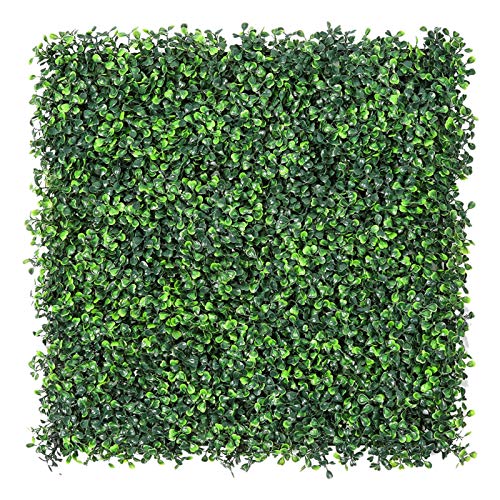Looking to make your outdoor space more private and beautiful? Natural Privacy Fence Plants are a great choice. They create a lush barrier that keeps your yard private. When picking plants, think about your yard’s sunlight and space.
Choosing the right plants can make your outdoor space stunning and private. You can pick from evergreen or deciduous plants. Arborvitae, Viburnum, and Hydrangea shrubs are good options that grow well in different zones.
Key Takeaways
- Natural Privacy Fence Plants can provide a beautiful and private outdoor space.
- Best Plants for Privacy Fences should be chosen based on specific yard needs.
- Privacy Shrubs for Yard can be a low-maintenance and attractive option
- Evergreen and deciduous plants offer different benefits and considerations
- USDA Hardiness zones should be considered when selecting plants
- Regular care and maintenance are necessary for healthy and thriving plants
- Natural privacy fences can be a cost-effective and environmentally friendly alternative to traditional fencing
Why Choose Natural Privacy Fence Plants?
Creating a private outdoor space has many options. Natural privacy fence plants are gaining popularity for their benefits. They add beauty and seclusion to your yard. Plants like Screening Plants for Privacy Fence, Privacy Hedge Plants, and Tall Privacy Plants block out unwanted views.
These plants offer a natural and sustainable solution. They are eco-friendly and can reduce your carbon footprint. They also attract wildlife and improve air quality, perfect for those who care about the environment.
Evergreen trees like Leyland cypress and Thuja green giants are great choices. Hedge plants like boxwood and arborvitae work well too. Climbing vines like clematis and wisteria create vertical screens. By picking the right plants, you can make a beautiful and useful natural privacy fence.
Benefits of Natural Fencing
- Provides a natural and sustainable solution
- Attracts wildlife and improves air quality
- Can be used to block out unwanted views and create a peaceful atmosphere
Environmental Impact
Natural privacy fence plants are good for the environment. They help reduce pollution and improve air circulation. Being around nature can also lower stress and boost mental health.
Cost-Effectiveness
Natural privacy fence plants are a smart choice for a private outdoor space. They need little care and can last a long time. This makes them a good investment for your home’s value and look.
Top Shrubs for Privacy Fences
Shrubs are great for making a natural privacy fence. They are Low Maintenance Privacy Plants that add beauty and coverage all year. Popular choices include arborvitae, boxwood, and ficus.
Arborvitae Varieties
Arborvitae is a top pick for privacy screens. It grows fast, reaching 50 to 60 feet tall and 12 to 20 feet wide. The ‘Green Giant’ arborvitae is known for growing up to 3 feet a year.
Boxwood Options
Boxwood is another great choice for privacy fences. It’s easy to care for and can be shaped as needed. Boxwood grows quickly, reaching 10 to 20 feet tall and 5 to 10 feet wide.
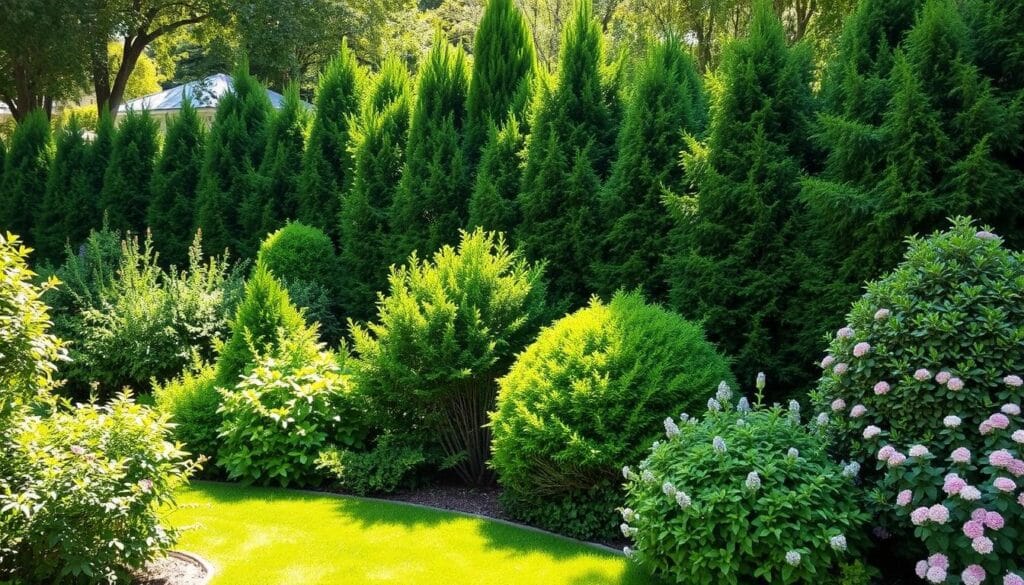
Ficus and Its Benefits
Ficus is a versatile shrub for privacy fences. It’s an Evergreen Privacy Plant that keeps your space looking good all year. Ficus also grows fast, reaching 10 to 20 feet tall and 5 to 10 feet wide.
| Shrub | Growth Rate | Mature Size |
|---|---|---|
| Arborvitae | 3 feet per year | 50-60 feet tall, 12-20 feet wide |
| Boxwood | 2 feet per year | 10-20 feet tall, 5-10 feet wide |
| Ficus | 2 feet per year | 10-20 feet tall, 5-10 feet wide |
Best Trees for Creating Privacy
Trees are a great choice for a natural privacy fence. They create a lush barrier, offer shade, and improve air quality. Fast-growing and evergreen trees are perfect for this. They can grow up to 1 to 4 feet a year, reaching 50 feet tall in 15 to 25 years.
The Leyland cypress grows 1 to 3 feet a year. The Green giant arborvitae adds 3 to 5 feet a year. The Italian cypress and Hybrid poplar grow 1 to 3 feet and 5 to 8 feet a year, respectively. These trees are ideal for a privacy fence, providing coverage and beauty all year.
Here are some other options for your Privacy Shrubs for Yard:
- Bald cypress: grows 18 to 24 inches annually and can reach up to 100 feet tall
- Chinese tallow trees: grow 12 to 18 inches per year, reaching up to 40 feet tall
- Cottonwoods: grow 3 to 4 feet per year, sometimes up to 70 feet tall
Choose trees that fit your climate and soil type for the best results. With the right trees, you can create a beautiful privacy fence that enhances your outdoor space.
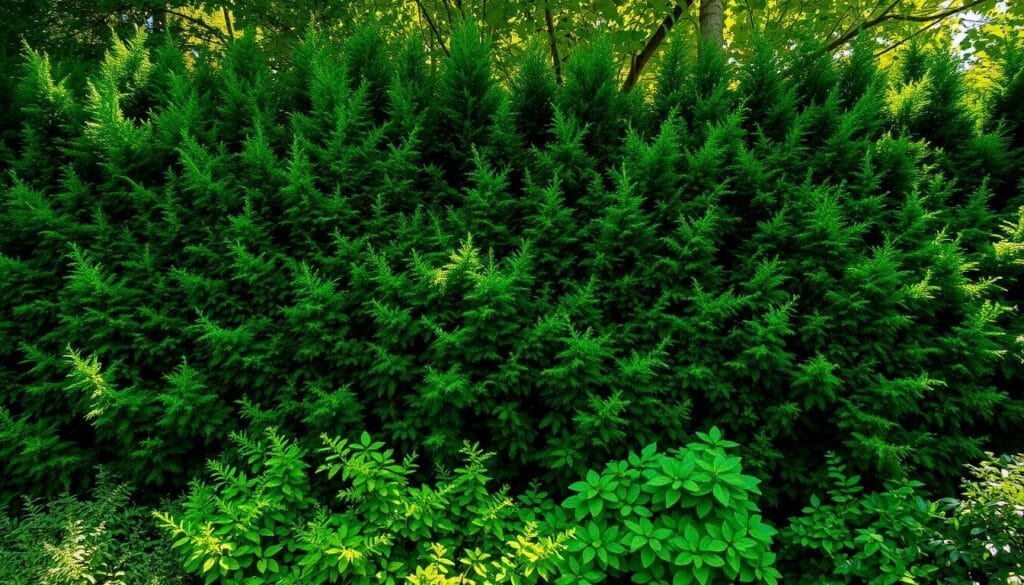
By picking the right trees and plants, you can make a stunning private outdoor space. Whether you want fast-growing trees or evergreen ones, there are many options to choose from. This will help you create beautiful Natural Privacy Fence Plants.
| Tree | Growth Rate | Mature Height |
|---|---|---|
| Leyland cypress | 1 to 3 feet per year | up to 70 feet tall |
| Green giant arborvitae | 3 to 5 feet per year | 40 to 60 feet tall |
| Italian cypress | 1 to 3 feet per year | 50 to 115 feet tall |
Selecting the Right Plants for Your Climate
Choosing the right plants for your climate is key for a natural privacy fence. You need plants that look good and can handle diseases, pests, and climate changes. Screening Plants for Privacy Fence can guide you. Arborvitae or Juniper are good choices because they’re tough and grow well in many places.
It’s also important to think about your hardiness zone. Plants fit different zones, and picking the wrong one can harm your plants. Tall Privacy Plants like Emerald Colonnade Holly or Korean Fir are great but check their zone first.
Here are some things to think about when picking plants for your climate:
- Hardiness zone: Pick plants that match your zone for the best growth.
- Drought resistance: Choose plants that can handle dry weather.
- Seasonal considerations: Think about how the seasons will affect your plants.
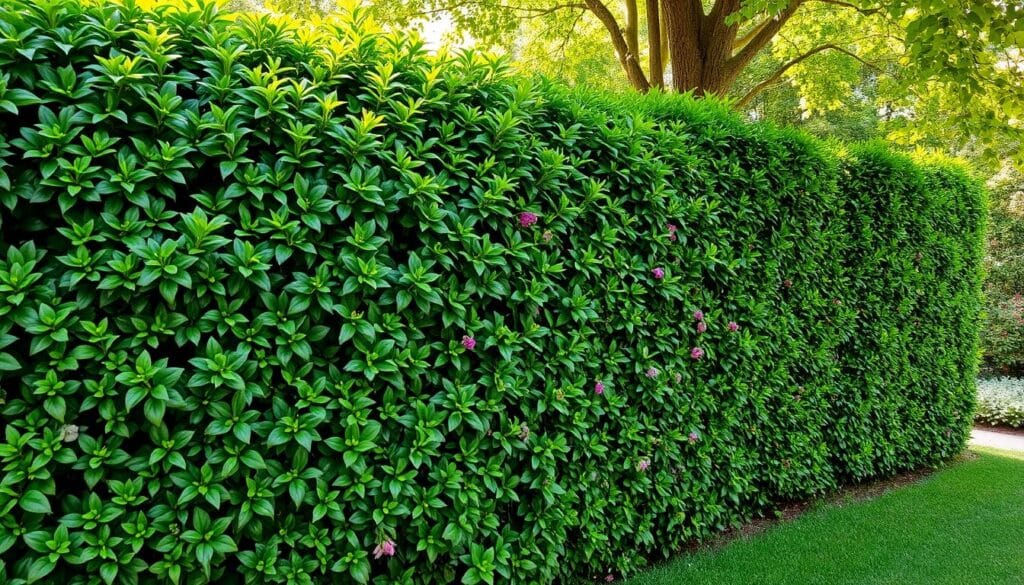
By keeping these points in mind and picking the right plants, you can make a beautiful natural privacy fence. It will give you years of enjoyment.
| Plant | Hardiness Zone | Drought Resistance |
|---|---|---|
| Arborvitae | 3-7 | Medium |
| Juniper | 4-9 | High |
| Emerald Colonnade Holly | 7-9 | Medium |
Planning Your Natural Privacy Fence Layout
When designing your natural privacy fence, think about the layout and spacing of your plants. You want a space that’s both beautiful and functional. It should offer the right mix of privacy and looks. To get this right, consider the mature size of your plants, like Evergreen Privacy Plants, and leave enough space for them to grow.
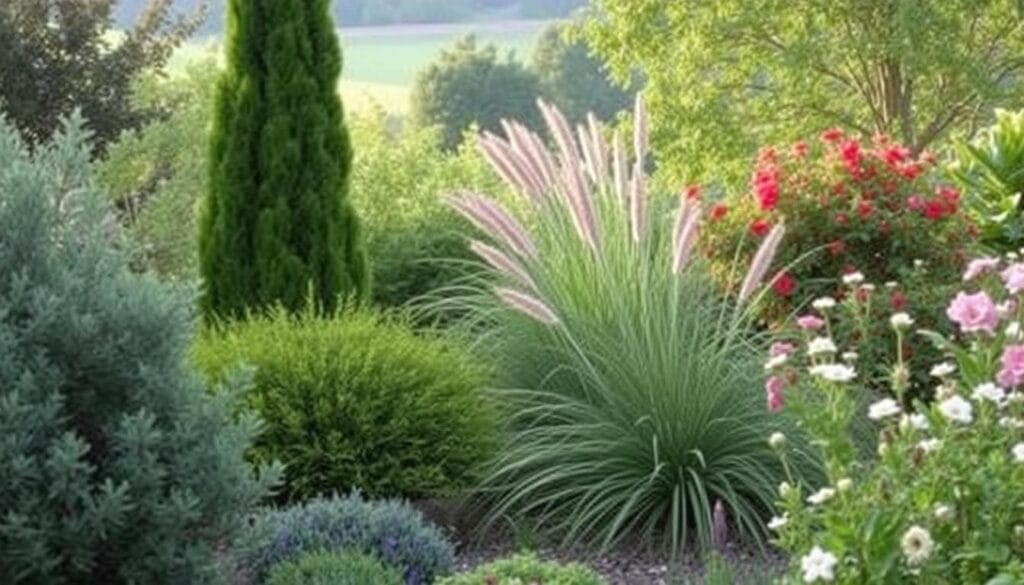
Plant your trees and shrubs at least an arm’s length apart. This is important, considering their mature size. For example, dwarf trees need 6-8 feet between each other. This space lets them grow without getting crowded.
Designing for Aesthetics and Functionality
To make your natural privacy fence stunning, explore different design options. Mix Fast Growing Privacy Plants and Evergreen Privacy Plants for a layered look. Use plants with various textures and colors to add depth and interest.
Some great design ideas include:
- Layering shrubs and trees for a dense, private area
- Using plants with different growth habits for visual interest
- Adding plants with fragrant flowers or foliage for a sensory experience
By planning your natural privacy fence layout, you can create a beautiful and useful space. Choose Low Maintenance Privacy Plants to make upkeep simple and fun.
Maintenance Tips for Privacy Plants
To keep your private plants healthy, regular care is key. This includes pruning to keep them shaped and pest control to avoid damage. By picking the right plants and following care tips, you’ll have a beautiful and private yard.
Some important things to remember for your privacy plants are:
- Pruning: Regular pruning keeps your plants looking good and growing well.
- Pest management: Watch out for pests like aphids and spider mites. Use safe methods to control them.
- Watering: Make sure your plants get enough water but don’t overdo it to avoid root rot.
By following these tips and picking the right plants, you can have a lovely private outdoor area. Plants like Thuja Green Giant Arborvitaes, Leyland Cypress trees, and Hollies grow fast and can get up to 20 feet tall.
Always check the specific care needs of your plants. With the right care, your privacy plants will flourish. They’ll give you a beautiful and private space for many years.
| Plant | Growth Rate | Height |
|---|---|---|
| Thuja Green Giant Arborvitaes | Up to 5 feet per year | 50-70 feet |
| Leyland Cypress trees | 3-5 feet per year | Up to 70 feet |
| Hollies | Relatively fast | Up to 20 feet |
Native Plants for Privacy Fences
Native plants are a great choice for a natural privacy fence. They are beautiful, sustainable, and good for wildlife and air quality. For a Screening Plants for Privacy Fence, pick native species that fit your climate and zone.
Common lilac and Eastern red cedars are good examples. They are beautiful and grow tall, perfect for Tall Privacy Plants. Native grasses like big bluestem and switchgrass add texture. American Wisteria makes stunning, fragrant Privacy Hedge Plants.
Native plants have many benefits for your privacy fence:
- They need less care and water
- They attract local wildlife
- They improve air quality and provide oxygen
- They resist diseases and pests well
Choosing native plants for your Screening Plants for Privacy Fence is smart. They block views and help the environment. Mix different native plants, like Privacy Hedge Plants and Tall Privacy Plants, for a unique fence.
| Plant | Height | Width | Hardiness Zone |
|---|---|---|---|
| Common Lilac | 10-15 feet | 6-8 feet | 3-7 |
| Eastern Red Cedar | 50-60 feet | 10-15 feet | 2-9 |
| American Wisteria | 20-30 feet | 10-15 feet | 5-9 |

DearHouse Artificial Ivy Privacy Fence, 118x59in Faux Ivy Leaf Decoration
Realistic Green Ivy Look: Enjoy a natural, lush appearance with artificial ivy leaves that add charm to any indoor or outdoor space. The lifelike design provides an earthy feel without requiring maintenance or watering.
Easy Installation & Customization: This ivy fence is flexible and easy to install with zip ties or tape. It can be cut to achieve the perfect size and shape for walls, fences, and privacy screens.
Durable & Fade-Resistant: Made from high-quality plastic and polyester, this artificial hedge maintains a fresh and evergreen look all year round. The sturdy mesh backing adds extra durability and easy installation.
Provides Privacy & Sun Protection: Densely packed leaves offer an effective privacy barrier while allowing airflow. This makes it ideal for balconies, patios, gardens, and pool areas.
Perfect for Any Space: Whether used as a fence cover, wall decoration, or trellis enhancement, this lightweight ivy fence is easy to move and reposition, making it perfect for home improvement and landscaping.
59.99 USD
Check out this amazing!Popular Privacy Plant Combinations
Creating a natural privacy fence is easier with the right plant mix. Choose Evergreen Privacy Plants like holly and arborvitae for all-year coverage. Layering shrubs and trees make a dense, private area that also helps local wildlife.
Pair Fast Growing Privacy Plants like forsythia and privet with Low Maintenance Privacy Plants like boxwood and yew. This mix works well in many zones and needs little care. For a rustic feel, add native plants like switchgrass and rose of Sharon.
- Choose plants that complement each other in terms of texture, color, and growth habits.
- Consider the mature size of each plant to ensure a balanced and harmonious layout.
- Select plants that are suitable for your local climate and hardiness zone
Follow these tips and pick the right plants for a beautiful, functional natural privacy fence. It will make your outdoor space even better.
Conclusion: Embrace Natural Privacy in Your Garden
Incorporating natural privacy plants into your garden is a smart choice. It offers a beautiful, sustainable, and cost-effective way to create seclusion and tranquility. You can choose from towering arborvitae, fragrant lilacs, or a mix of shrubs and trees.
These living barriers not only make your home look better and increase its value. They also purify the air, provide a home for wildlife, and block out noise. When planning your natural privacy fence, think about your local climate, sun exposure, and the look you want.
With some research and planning, you can turn your outdoor space into a lush, private oasis. It will reflect your style and improve your life. So, start exploring natural privacy fence plants and enjoy the beauty and benefits they bring to your garden.
FAQ
What are the benefits of using natural plants for privacy fences?
Natural plants create a lush, eco-friendly privacy fence. They enhance aesthetics, improve air quality, attract wildlife, and require minimal maintenance.
What are the best shrubs for creating a natural privacy fence?
Great shrubs for privacy include arborvitae, boxwood, and holly. These offer dense coverage, are easy to maintain, and thrive in various climates.
What are the best trees for creating a natural privacy fence?
Evergreen trees like pine, cedar, and cypress provide year-round privacy and noise reduction while adding beauty to your outdoor space.
How do I select plants suitable for my climate and hardiness zone?
Choose plants native to your region and suited for your USDA hardiness zone to ensure resilience against local weather conditions.
How do I properly plan and design my natural privacy fence layout?
Plan your layout by considering plant spacing, sunlight exposure, and layering heights for an effective and visually appealing natural fence.
What maintenance tips should I follow to keep my natural privacy fence healthy?
Regular pruning, mulching, and eco-friendly pest control keep your plants healthy and encourage dense, long-lasting growth.
What are the benefits of using native plants for my natural privacy fence?
Native plants support local wildlife, require less water and fertilizers, and are naturally adapted to your climate, making them a sustainable choice.
What are some popular privacy plant combinations for a natural fence?
Layer shrubs and trees like junipers with hydrangeas for texture. Combine evergreens and flowering vines for privacy and seasonal beauty.
Source Links
- Create Your Own Private Outdoor Oasis With Trees and Shrubs – https://www.thepioneerwoman.com/home-lifestyle/gardening/g43636129/best-trees-for-privacy/
- Top 8 Plants for Privacy & Screening – https://hicksnurseries.com/trees-and-shrubs/the-best-trees-shrubs-for-privacy/
- Plant These 17 Trees Along a Fence for Increased Privacy – https://www.thespruce.com/above-fence-screening-trees-7500895
- Why Choose Natural Fence Materials for Your Property – https://boundaryfence.com/why-choose-natural-fence-materials-for-your-property/
- Backyard Privacy Ideas: How to Create a Natural Screen – https://fortsmithlandscaping.com/blog/backyard-privacy-ideas/
- 10 Living Fence Ideas – https://www.familyhandyman.com/list/living-fence/?srsltid=AfmBOoqX1brbxIwayD9KU88CnRFDe8Ske8FebNaZ-QPf2UGOiLYsM0Q6
- Create a Living Fence with These 12 Fast-Growing Shrubs for Privacy – https://www.veranda.com/outdoor-garden/g60140822/best-fast-growing-shrubs-for-privacy/
- Plant These 21 Fast-Growing Privacy Shrubs for a Secluded Yard – https://www.thespruce.com/fast-growing-shrubs-for-privacy-hedges-specimens-4767365
- 13 Fast-Growing Trees for a Lush, All-Natural Privacy Screen in Your Yard – https://www.bhg.com/gardening/trees-shrubs-vines/trees/fast-growing-trees/
- 13 Best Fast-Growing Trees To Create Privacy Without A Fence – https://www.southernliving.com/fast-growing-trees-8656947?srsltid=AfmBOoobAPC4NolAB54Ej0f7xnqwLbnlgw2HIV-NLo51YeJ0yN1zmsoK
- Plants for Mixed Privacy Screens – https://extension.umd.edu/resource/plants-mixed-privacy-screens
- 15 Landscape Plants That Pros Recommend for Adding Privacy – https://www.realsimple.com/home-organizing/gardening/outdoor/plants-for-privacy-from-neighbors
- How to Build a Living Fence for Privacy and Beauty – https://www.bhg.com/gardening/trees-shrubs-vines/trees/how-to-build-a-living-fence/
- 10 Living Fence Ideas – https://www.familyhandyman.com/list/living-fence/?srsltid=AfmBOoqXi8ZI5EJybZqF5BEAS8lKEexHrF6vqjjiZsgEEwvBEjBeCh2A
- Planting the Perfect Privacy Screen – https://gardengoodsdirect.com/blogs/news/planting-the-perfect-privacy-screen?srsltid=AfmBOoonOLo6tqhn9uDW7YjGEYC5bVRRLNlfJsEnAGFXhgGPk458QLEX
- How To Make Your Backyard More Private – https://www.thisoldhouse.com/fences/21014889/a-private-matter
- Privacy Plants – https://www.waysidegardens.com/garden-solutions/privacy-plants.html?srsltid=AfmBOoosixEXJoE-6RgmOryauAklEq8KRJbl4V8-dG5pY5iQkbLHSRVP
- Native Indiana Plants that Provide Privacy in Your Landscape- Lemcke Landscape – https://lemckelandscape.com/native-indiana-plants-that-provide-privacy-in-your-landscape/
- 18 Best Plants To Add Privacy To Your Yard – https://www.southernliving.com/plants-for-privacy-7643312?srsltid=AfmBOoqoE6jGnt82FzOAi5-pZoDNzqxZvOOcDfZp050fwx2S6eymchd9
- The 6 Best Shrubs for Creating a Privacy Fence or Screen – https://www.growjoy.com/the-6-best-shrubs-for-creating-a-privacy-fence-or-screen/?srsltid=AfmBOoo98GNISZvZUUwN_VuO6eErOaGauRyrjHgZ0SXR-DAwezZ7Bsxr
- Want Your Hedges to Bloom With Flowers? 21 Shrubs You Should Try – https://www.thespruce.com/best-shrubs-for-hedges-4151139
- Creating Natural Privacy Screens with Arborvitae: A Comprehensive Guide – https://greengianttrees.com/blog/creating-natural-privacy-screens-with-arborvitae-a-comprehensive-guide
- Create a Living Fence with These Unique Ideas – https://www.ergeon.com/blog/post/living-fence-ideas
- Creating Privacy in Your Outdoor Space: Landscape Design Ideas for Secluded Retreats – https://scape-abilities.com/creating-privacy-in-your-outdoor-space-landscape-design-ideas-for-secluded-retreats/
- How to Set Up a Vegetable Garden in Small Spaces



